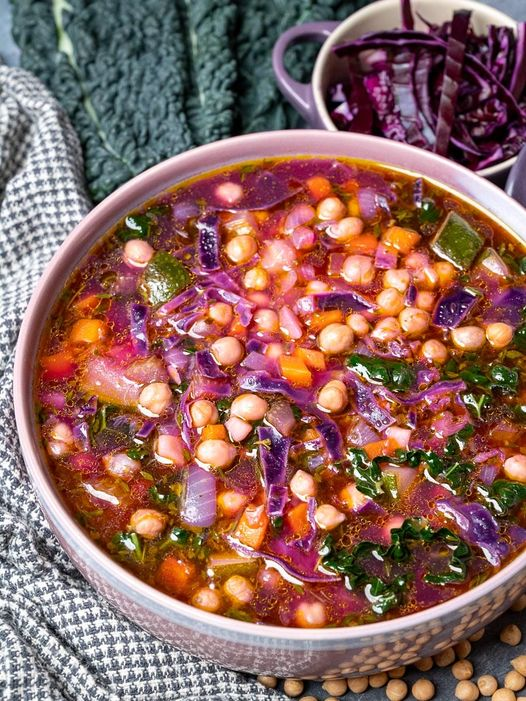In a world where busy schedules and processed foods reign supreme, the Vegetable Detox Soup emerges as a beacon of health and vitality. This vibrant concoction of fresh vegetables, herbs, and spices not only tantalizes the taste buds but also provides a much-needed reset for both body and soul. With each spoonful, one embarks on a journey of rejuvenation and renewal, leaving behind the burdens of modern life in favor of nourishment and vitality.
Imagine a pot bubbling with an array of colorful vegetables, each one bursting with flavor and nutrients. From crunchy carrots to leafy greens, every ingredient plays a vital role in detoxifying the body and replenishing essential vitamins and minerals. With the gentle simmering of the broth, the essence of each vegetable infuses the soup, creating a symphony of flavors that dance on the palate.
But the Vegetable Detox Soup offers more than just physical nourishment; it serves as a reminder of the importance of self-care and mindfulness in today’s fast-paced world. In taking the time to prepare and savor this wholesome dish, one cultivates a deeper connection with both food and body, fostering a sense of well-being that extends far beyond the kitchen.
Moreover, the Vegetable Detox Soup embodies the principles of simplicity and sustainability, utilizing seasonal produce and minimal processing to maximize flavor and nutrition. By embracing whole, plant-based ingredients, this soup not only supports personal health but also promotes environmental sustainability and ethical eating practices.
But perhaps the most profound aspect of the Vegetable Detox Soup lies in its ability to heal and rejuvenate from the inside out. As the nourishing broth and nutrient-rich vegetables work their magic, toxins are flushed from the body, leaving behind a sense of lightness and vitality. With each spoonful, one can feel the stresses of daily life melting away, replaced by a renewed sense of energy and well-being.
In essence, the Vegetable Detox Soup is more than just a meal; it’s a ritual of self-care, a celebration of nature’s bounty, and a reminder of the transformative power of wholesome, nourishing food. So, whether you’re looking to kickstart a healthier lifestyle or simply seeking a moment of culinary bliss, let this soul-warming soup be your guide to a journey of detoxification, rejuvenation, and vibrant living.
Here is some Important tips:
Gut Health:
Plant-based diets are often associated with improved gut health due to the high fiber content from fruits, vegetables, and whole grains. A healthy gut microbiome is linked to better digestion and overall well-being.
Anti-Inflammatory Properties:
Many plant-based foods have anti-inflammatory properties, which can help in reducing inflammation in the body. Chronic inflammation is associated with various health issues, and a vegan diet may contribute to its prevention.
Sports Performance:
Contrary to the misconception that vegan diets lack protein, many successful athletes follow plant-based diets to enhance their performance. Plant-based proteins can support muscle building and recovery.
Reduced Risk of Foodborne Illnesses:
Plant-based diets eliminate the risk of foodborne illnesses associated with the consumption of undercooked or contaminated animal products.
Economic Impact:
A vegan diet can be more economical as plant-based protein sources tend to be cost-effective compared to some animal products. It may be a budget-friendly option for individuals or families.
Mindful Eating:
Adopting a vegan lifestyle often promotes mindful eating. Being more conscious of food choices and sources can lead to a healthier relationship with food and a greater appreciation for the environmental impact of dietary decisions.
Preservation of Biodiversity:
The expansion of animal agriculture often leads to habitat destruction and loss of biodiversity. Choosing a vegan diet supports the preservation of ecosystems and the protection of various species.
Culinary Diversity:
Veganism introduces individuals to a diverse range of cuisines and ingredients from around the world. Exploring plant-based cooking can be a culinary adventure, embracing flavors and techniques from different cultures.
Reduced Antibiotic Resistance:
The use of antibiotics in animal farming contributes to the rise of antibiotic-resistant bacteria. Opting for a vegan diet can be a way to reduce the demand for such practices and promote responsible antibiotic use.
Cruelty-Free Beauty and Personal Care:
Veganism extends to beauty and personal care products. Choosing cruelty-free, vegan alternatives ensures that your lifestyle aligns with ethical choices beyond just dietary preferences.
Vegetable Detox Soup

Ingredients:
1 tablespoon olive oil
1 medium onion, diced
1 medium carrot, diced
2-3 celery sticks, diced
1 medium parsnip, diced
1 medium zucchini, cubed
1/2 small red cabbage, sliced (about 1/2 lb/ 225 g)
2 large garlic cloves, minced
1 teaspoon dried oregano
1-2 tablespoons fresh thyme, finely chopped
1 can (14 oz / 400 g) chickpeas, drained and rinsed
6 cups (1.5 litres) vegetable stock
Juice of half a lemon
2 cups (75 g) Tuscan kale, roughly chopped
Salt and freshly ground black pepper to taste
Instructions:
Prepare the Vegetables:
Heat olive oil in a large stock pot or Dutch oven over medium heat.
Add diced onion, carrot, celery, and parsnip to the pot. Sauté for 8-10 minutes until softened.
Add Zucchini and Red Cabbage:
Stir in cubed zucchini and sliced red cabbage. Cook for an additional 2-3 minutes.
Infuse with Aromatics:
Add minced garlic, dried oregano, and fresh thyme. Cook for 1 minute until fragrant.
Incorporate Chickpeas and Stock:
Add drained chickpeas and vegetable stock to the pot. Bring to a boil, then reduce heat to low. Cover and simmer for 15 minutes.
Finish with Lemon and Kale:
Stir in lemon juice and chopped Tuscan kale. Simmer for another 2-3 minutes until kale is wilted.
Season and Serve:
Season soup with salt and pepper to taste.
Ladle soup into bowls and serve hot.
